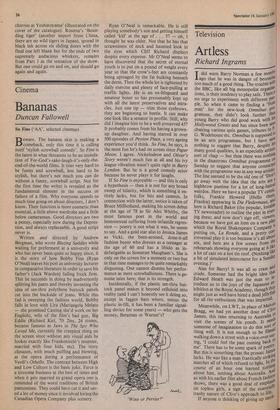Cinema
Bananas
Duncan Fallowell
So Fine (`AA', selected cinemas)
Beware. The banana skin is making a comeback, only this time it is calling itself 'stylish screwball comedy'. So Fine is the latest in what threatens to be an inunda- tion of For-God's-sake-laugh-it's-only-the- end-of-the-world films. It tries very hard to be funny and screwball, less hard to be stylish, but there's not much you can do without a funny, screwball script. Not for the first time the writer is revealed as the fundamental element in the success or failure of a film. Why everyone spends so much time going on about directors, I don't know. Their function is more cosmetic than essential, a little above wardrobe and a little below cameraman. Good directors are two a penny, especially now during the Depres- sion, and always replaceable. A good script never is.
Written and directed by Andrew Bergman, who wrote Blazing Saddles while waiting for preferment at a university and who has never been quite so happy since, it is the story of how Bobby Fine (Ryan O'Neal) leaves his post as university lecturer in comparative literature in order to save his father's (Jack Warden) failing frock firm. This he succeeds in doing by inadvertently splitting his pants and thereby inventing the idea of see-thru polythene buttock panels cut into the backside of jeans. While this fad is sweeping the fashion world, Bobby falls in love with Lira (Mariangela Melato — she promised Casting she'd work on her English), wife of the film's bad guy, Big Eddie (Richard Kiel, 7ft tins, 24 stones, became famous as Jaws in The Spy Who Loved Me, currently the creepiest thing on the screen since without any visual aids he lookes exactly like Frankenstein's monster, married with four kids, etc). The story climaxes, with much puffing and blowing, at the opera during a performance of Verdi's Othello. The contrast between High and Low Culture is the basic joke. Farce is a tiresome business at the best of times and when it gets married to grand opera one is reminded of the worst traditions of British pantomime. They could have cut it and sav- ed a lot of money since it involved hiring the Canadian Opera Company plus scenery. Ryan O'Neal is remarkable. He is still playing somebody's son and getting himself called 'kid' at the age of . . . 37 — oh, I thought he was older. Not that he has that scrawniness of neck and haunted look in the eyes which Cliff Richard displays despite every expense. Mr O'Neal seems to have discovered that the secret of eternal youth is to put on a pound of weight every year so that the crow's-feet are constantly being upstaged by the fat bulking beneath the derm. Then the whole lot is tightened by daily exercise and plenty of face-pulling at traffic lights. He is an ex-lifeguard and amateur boxer so has presumably kept up with all the latest preservatives and mira- cles. Just one tip — trim those eyebrows, they are beginning to beetle. It can make one look like a senator in profile. Still, why did I imagine him to be a well-preserved 45? It probably comes from his having a grown- up daughter. And having starred in over 500 episodes of Peyton Place, a very ageing experience you'd think. So Fine, he says, is the most fun he's had on screen since Paper Moon. I agree. Nickelodeon and Oliver's Story weren't much fun at all and his ivy league vibration wasn't quite right in Barry Lyndon. But he is a good comedy actor because he never plays it for laughs.
If So Fine is enjoyable — and this is only a hypothesis — then it is not for any broad sweep of hilarity, which is something it en- tirely lacks, but for bits and cameos. In connection with the latter, notice is taken of Bruce Millholland, making his screen debut at the age of 78 as Sir Alec Whitby, the most famous poet in the world and homosexual suffering from infantile regres- sion — poetry is not what it was, he seems to say. And a gold star also to Jessica James as Vicki, the been-around, done-it-all fashion buyer who dresses as a teenager at the age of 60 and has a libido as in- defatigable as Somerset Maugham's. She is only on the screen for a moment or two but in that time manages to be quite remarkably disgusting. One cannot dismiss her perfor- mance as mere screwballsiness. There is ge- nuine taint here; that is its strength.
Incidentally, if the plastic see-thru but- tock panel makes it beyond celluloid into reality (and I can't honestly see it doing so, except in faggot bars where, minus the plastic in-fill, it has been a familiar signal- ling device for some years) — who gets the money, Bergman or Warner's?
`Wine or Perrier?'


































 Previous page
Previous page